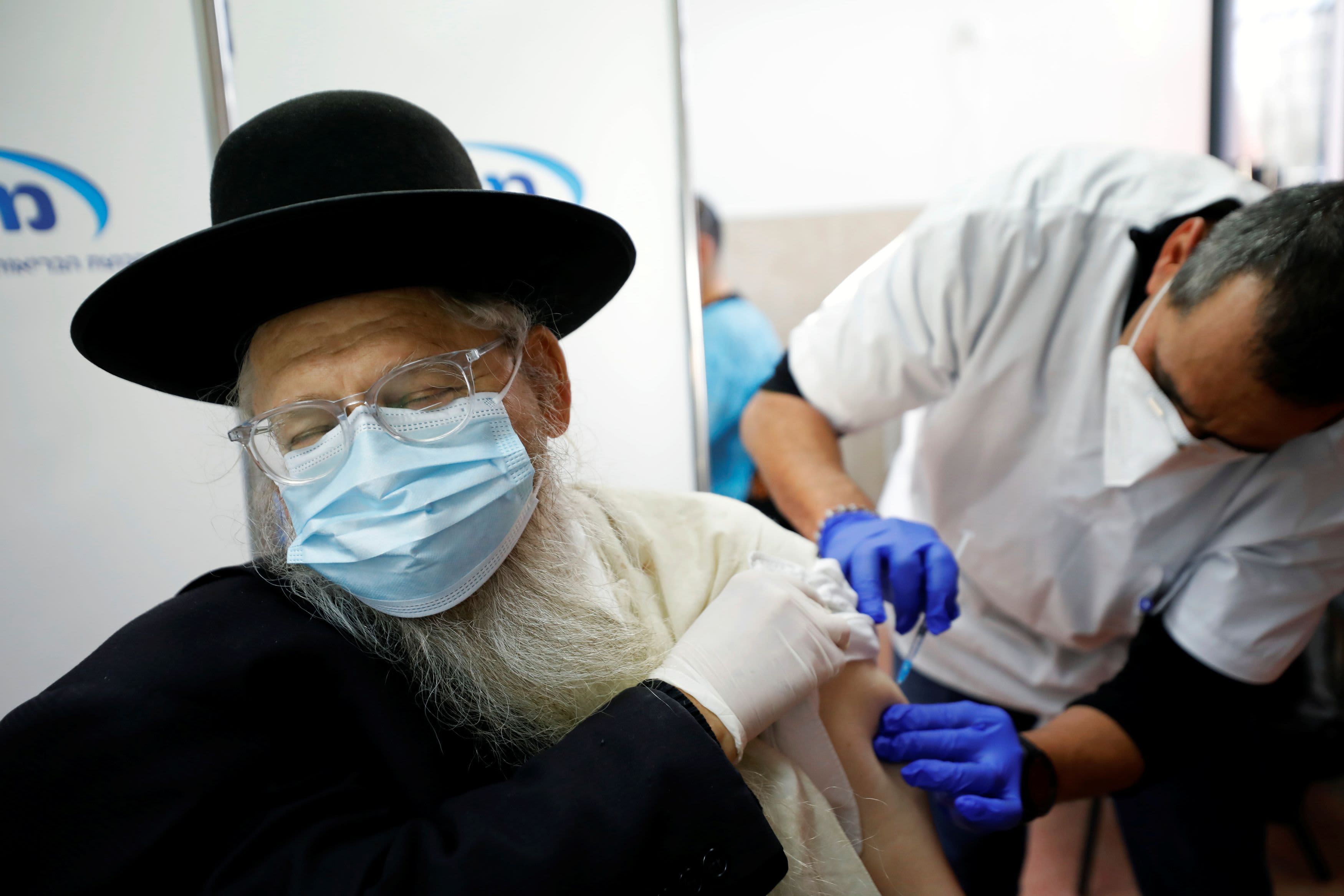Despite its early success with the rollout of the Covid-19 vaccine, Israel is quickly heading for a third national lockdown as the virus spreads.
Prime Minister Benjamin Netanyahu and members of his cabinet are blaming it on a faster spreading strain first detected in the United Kingdom last month. Israeli officials confirmed four cases of that strain on Dec. 23, days after the British Prime Minister Boris Johnson said it was an emerging problem there.
An ultra-Orthodox Jewish man receives a vaccination against the coronavirus disease (COVID-19) as Israel continues its national vaccination drive, during a third national COVID lockdown, at a Maccabi Healthcare Services branch in Ashdod, Israel December 29, 2020.
Amir Cohen | Reuters
In a cabinet meeting Tuesday, Netanyahu told ministers, “we are in a state of emergency” as ministers agreed to a lockdown set to begin Friday that shutters schools, non-essential businesses and forces residents to stay within a one kilometer radius of their homes.
This comes amid a global uproar over a slow vaccine rollout in the U.S. and elsewhere that Israel has largely been able to avoid.
Tom, 69, and Judy Barrett, 67, from Marco Island wait in line in the early morning hours at Lakes Park Regional Library to recieve the COVID-19 vaccine in Fort Myers, Florida, U.S. December 30, 2020. Picture taken December 30, 2020.
Andrew West | USAToday | Reuters
Israeli officials have boasted that the country has vaccinated more people in the first nine days of its vaccine campaign that than it had in total Covid-19 infections since the beginning of the pandemic.
The country had already vaccinated roughly 7% of its population of more than 9.2 million as of last week. The Israeli Ministry of Health projects up to 90% of the “at-risk” population will receive their second of two shots from the Pfizer BioNTech vaccine within the next 25 days.
The effectiveness of its vaccine campaign has made it a potential model for the rest of the world, epidemiologists say.
Israel had an early advantage, said Dr. Itamar Grotto, the associate director general of the Israel Ministry of Health and one of the officials leading the charge. “We have a national vaccination registry which was established a few years ago, the whole country is on one database,” he said in an exclusive interview with CNBC.
The registry was started to ensure children got all of their shots. That infrastructure allowed Israel to be better prepared for this outbreak than many other countries battling the virus. Israel had a frightening dry run for Covid-19 when it was hit with a wild-type poliovirus outbreak in 2013.
The country brought that illness under control with an intense inoculation campaign that led the way to today’s vaccine database.
Israel’s medical infrastructure also provides a few other advantages, he said:
- Medical care in Israel is largely socialized.
- Israel has only four health maintenance organizations that serve citizens throughout the country, while many other nations have more competition in the system.
- Those HMOs are all connected to the country’s national health service, which keeps records on every Israeli citizen.
- The entire system is digitized, under a single, national system.
Before packages carrying the Pfizer–BioNTech vaccine began arriving in Israel Dec. 9, a panel put together by the government began sorting out who would get the shots in the first wave.
Boxes containing the Pfizer-BioNTech COVID-19 vaccine are prepared to be shipped at the Pfizer Global Supply Kalamazoo manufacturing plant in Portage, Michigan, December 13, 2020.
Morry Gash | Pool | Reuters
At the same time, the Ministry of Health began setting up a communication and distribution system so when the vials containing the vaccine arrived, they could hit the ground running, he said.
Patients in the database in the first group to receive the vaccine were given an appointment by email, text or through an online sign-up sheet with a date and a time range to get their shot. Regular clinics, community centers, hospitals and a few sports stadiums were transformed into vaccination centers and staffed with previously trained health care workers, waiting for action, he said.
Because the vaccine can’t be refrozen after it is thawed, Israel is encouraging managers at immunization sites to use every dose.
Grotto said there’s a stand-by list of people who can step in on short notice if other people don’t show up by the end of the day. Officials at distribution centers are also dividing vials into smaller packages, appropriate for each center, another effort to prevent waste.
Israel’s challenges, however, are far from over. Health officials recently confirmed that almost 500 doses were wasted in the southern part of the country because health workers couldn’t get enough people on stand-by to come to vaccination centers.
Israel is expecting more shipments from Pfizer. It also made deals with Moderna and AstraZeneca, however, those shots haven’t been delivered yet. But they are expected soon. Israel is also working on their own vaccine, but there’s no word on when that will be ready.
